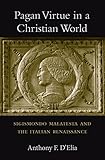Pagan virtue in a Christian world : Sigismondo Malatesta and the Italian Renaissance / Anthony F. D'Elia.
Material type: TextPublisher: Cambridge, Massachusetts : Harvard University Press, [2016]Description: 1 online resource (x, 355 pages) : illustrationsContent type:
TextPublisher: Cambridge, Massachusetts : Harvard University Press, [2016]Description: 1 online resource (x, 355 pages) : illustrationsContent type: - 9780674088528
- 0674088522
- Malatesta, Sigismondo Pandolfo, signore di Rimini, 1417-1468
- Malatesta, Sigismondo Pandolfo, signore di Rimini, 1417-1468
- Paganism -- Italy -- Rimini
- Paganism in literature
- Christianity and other religions
- Civilization, Medieval
- Italy -- History -- 1268-1492
- Paganisme -- Italie -- Rimini
- Paganisme dans la littérature
- Christianisme -- Relations
- Civilisation médiévale
- Italie -- Histoire -- 1268-1492
- HISTORY -- Europe -- Italy
- HISTORY -- Renaissance
- Christianity and other religions
- Civilization, Medieval
- Paganism
- Paganism in literature
- Italy
- Italy -- Rimini
- Italië
- Kulturhistoria
- Hedendom i litteraturen
- Hedendom
- Kristendom och andra religioner
- Historia
- Italien -- Rimini
- 1268-1492
- 945/.05092 23
- BL432 .D45 2016
- online - EBSCO
| Item type | Current library | Call number | URL | Status | Notes | Barcode | |
|---|---|---|---|---|---|---|---|
 eBook
eBook
|
Biblioteca "Angelicum" Pont. Univ. S.Tommaso d'Aquino Nuvola online | online - EBSCO (Browse shelf(Opens below)) | Online access | Not for loan (Accesso limitato) | Accesso per gli utenti autorizzati / Access for authorized users | (ebsco)1133816 |
Browsing Biblioteca "Angelicum" Pont. Univ. S.Tommaso d'Aquino shelves, Shelving location: Nuvola online Close shelf browser (Hides shelf browser)
Includes bibliographical references and index.
The Pope's wrath and the black legend 1 -- Court culture and the Renaissance in Rimini -- The Greek Renaissance and the return of the Paideia -- An ancient hero on Renaissance battlefields -- Astrology, Plato, and pagan worship -- Pagan sex and heroic virtue -- Questioning virtue in Malatesta literature -- Sigismondo's peril and defiance -- Conclusion: the pagan Renaissance.
Print version record.
In 1462 Pope Pius II performed the only reverse canonization in history, damning a living man to an afterlife of torment. What had Sigismondo Malatesta, Lord of Rimini and a patron of the arts, done to merit this fate? Anthony D'Elia shows how the recovery of classical literature and art during the Italian Renaissance led to a revival of paganism.-- Provided by Publisher.









